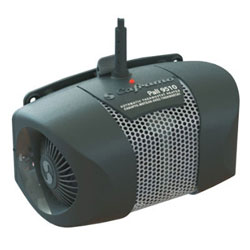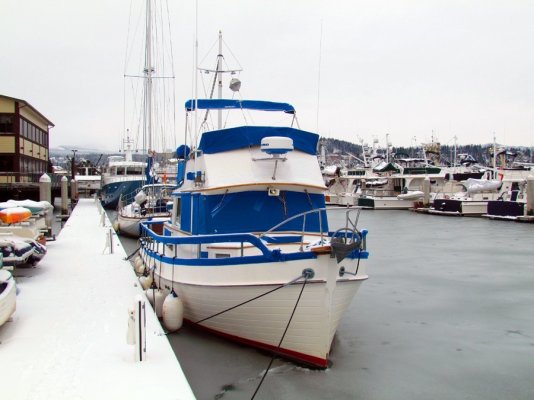Mike,
You're in an area (VA) that wintering in the water is not much of a problem. I've been sailing and motor boating for 45 years out of Rhode Island. We've always hauled the boat for the Winter, but last Winter, I stored the boat in the water. We were up the Pawcatuck River, where it turns to fresh water in Westerly RI. There are many marinas in CT and RI that have in-water storage capacity. Here's my experience.
1. At the end of November, we washed and covered the boat with a coat of wax (not buffed out). I've stored all my boats uncovered but for a coat of wax. While the marina had shut off the water, for washing, I was using my washdown system drawing fresh water from the river.
2. Fresh water system was flushed and winterized with RV antifreeze.
3. Engine acid flushed and filled with the RV stuff. If you're running the engine periodically, at this location, we could have waited and winterized the engine just for January and February. At the dock next to us, a local seal watch downeaster was running seal watch trips until December 31st, and resumed March 1st.
4. My Cummins diesel has an immersion heater that I keep plugged in from November to March. That alone keep the engine and engine compartment warm (relatively speaking).
5. During the super cold January and February days, the marina had a blubber system going, so there wasn't an ice problems.
Would I store in the water again? Not really, at least in this location. I can keep the boat in the water at my boat yard until about the middle of November, and be relaunched by mid-April. I've hauled as late as December 1st, and re-launched by April 1st. The problem I see is that, at least in New England, there isn't any real reason to take the boat out in the Winter. And if you need assistance out on the water, other than commercial fisherman, there are no other boaters out, and the tow services are not running. Besides, hauling over the Winter allows some hull and running gear maintenance, ding repairs, and you can even get a jump on bottom prep and painting during those rare 50 degree days.
A friend on mine has always stored his boat in the water in a well-protected marina in Wickford RI. He did a short-haul in October for bottom cleaning, zincs, and paint. He simply winterized his fresh water system and engine, and covered the boat with clear shrink wrap. Never had an issue. Of course, his boat, cosmetically, looks like it's been stored in the water. Difficult to get polishing, rubbing out, and dings taken care of while in the water. Oh, by the way, he retired a couple of months ago and moved to Charleston SC.
The biggest problem I had is that I was not able to get the boat hauled for bottom prep and paint until after Memorial Day. The yard was just too busy with normal boat prep and launches. Photo taken January 8, 2014.




